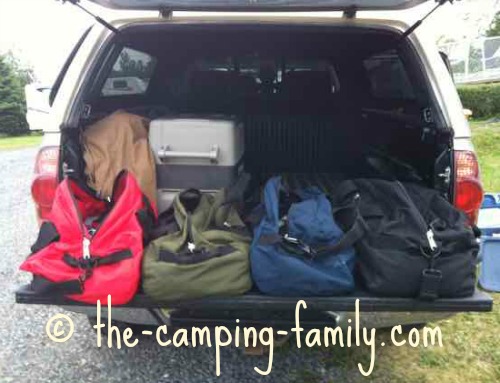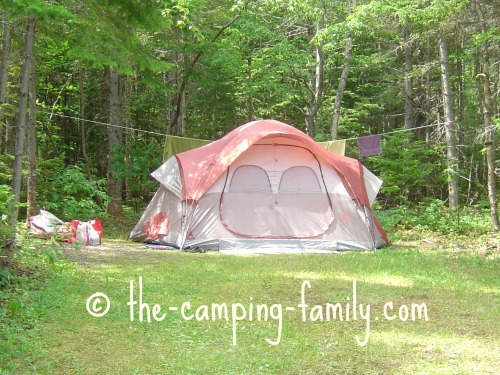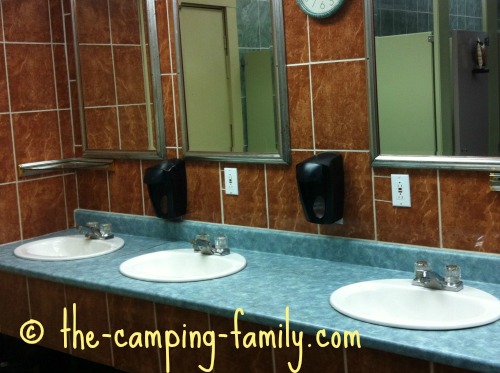Heat Exhaustion Symptoms
Knowing how to prevent, recognize and treat heat exhaustion symptoms is important for anyone who goes camping in the summer - or in the desert at any time of year.
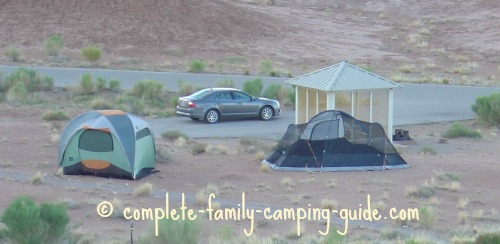
Understanding Heat Exhaustion
Our vital organs work best when our body temperature is about 98.6 F/37 C.
Our bodies are very efficient at getting rid of excess heat so that our core temperature remains at that optimal level.
But sometimes we overwhelm our bodies and that mechanism can't operate.
Heat exhaustion - the result of water and salt loss - is your body's signal that it is overheating.
It develops over hours or days - even in relatively cool conditions if you don't drink enough after vigorous exercise.
If you ignore heat exhaustion symptoms, you are in danger of progressing into heat stroke - a serious and potentially fatal condition.
How your body regulates its temperature
Heat gain
A body gains heat by
- metabolising (digesting, breathing, just doing its thing)
- exercising (which can increase heat gain 10x!)
- being in a hot environment (obviously, in a hot place you heat up faster)
Heat loss
In a hot environment, a body can get rid of heat by
- exhaling
- producing sweat, which evaporates on the skin, lowering the body temperature
- transferring heat from the blood to the skin, and then dilating the blood vessels on the skin so heat can easily leave the body
- coming into contact with cold objects
The equation is simple:
If heat loss is equal to or greater than heat gain, you stay cool.
Most of the time, this is what happens.
What if heat gain is greater than heat loss?
Obviously, if you do vigorous exercise on a hot or humid day, you may increase the heat produced by your metabolism faster than your defense mechanisms can remove it.
Your core temperature goes up.
You may experience heat exhaustion symptoms.
When the body can't cool itself, it gradually stops working. The brain, heart, liver and kidneys can't function properly.
Left untreated, the condition can cause permanent damage - or death.
Fortunately, avoiding such a dangerous scenario is easy if you just use your common sense.
How to stay cool and healthy
In conditions of high heat or humidity, here's how to avoid heat exhaustion symptoms:
Don't exert yourself.
Save that game of beach volleyball for later in the day when it's cooler.
Stay in the shade.
Get out a good book and relax in the hammock!
Dress sensibly.
Wear light colored, loosely fitting clothes.
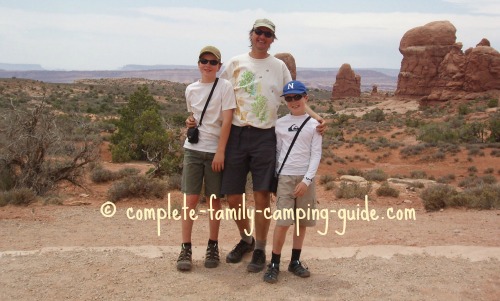
Drink plenty of liquids - before you feel thirsty.
Thirst is actually a sign that you are not replacing your fluids and are already becoming dehydrated.
Have a drink of water at least once every hour.
Children may be so involved in their play that they forget to stop for a drink. It's your job to remind them - again and again and again.
Having water bottles handy at all times makes it easier for everyone to remember.
If you are producing lots of clear light yellow urine, you are probably getting enough liquids. If not - you know what you need to do!
Avoid alcohol and caffeine.
They can affect your body's temperature-regulating mechanisms. Save them for when it's cooler.
Avoid electrolyte drinks and sport drinks during physical activity.
These drinks can slow the absorption of water from the bowel, making the liquid you take in less available to your body. Stick to water.
Go jump in the lake!
There's nothing like a swim to cool everyone down.
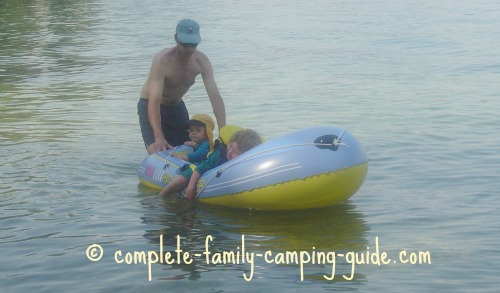
Make sure to take precautions to avoid sunburn!
Read about how to apply sunscreen here.
If you forget, you'll want to learn how to treat a sunburn!
Know when to be especially careful.
Heat exhaustion is more likely in these situations:
When the air is very dry
In extremely dry conditions, your sweat might evaporate so quickly that you don't even realize that you are sweating!
Without visible sweat, you might underestimate how hot you are. You can experience severe fluid loss before you know it.
When the air is very humid
When the air is saturated with moisture, sweat can't evaporate efficiently.
Your body still produces sweat, but it can't cool you down if it can't evaporate.
Symptoms of heat exhaustion
These are the most common heat exhaustion symptoms:
- thirst
- profuse sweating
- gooseflesh and chills
- headache
- nausea - with or without vomiting
- dizziness
- weakness
- rapid pulse
The body temperature might be normal or slightly elevated (98-105 F/37-41 C).
If these warning signs of heat exhaustion are ignored, heat exhaustion can progress to heat stroke - which is extremely serious and potentially fatal.
Heat Exhaustion First Aid
If you see any of the listed symptoms - in yourself or in someone else - here's what to do.
Get out of the sun.
Find a shady spot: under a tree, beneath an awning, or in a sun shelter. If you can't find shade, go indoors.
Wet the skin.
Soak cloths in water and place them on the skin.
Use a spray bottle to mist skin with water.
Drink water.
Drink slowly. Drink small, frequent amounts.
Drink as much as possible, even if the water is vomited up immediately. Some of it will be absorbed.
Drink an electrolyte drink.
Later, after any vomiting has ceased, mix about a litre/quart of water with a pinch of salt and a pinch of sugar. Drink this slowly.
Rest.
Stay in the shade and take it easy for the rest of the day.
If you don't deal with heat exhaustion symptoms, your condition can progress to heat stroke. Click here for information about preventing heat stroke and about heat stroke first aid.
It's important to note that both heat exhaustion and heat stroke can occur even at moderate temperatures - anytime the body heats up faster than it can cool itself.
Use common sense, and you'll never have to experience heat stroke or heat exhaustion.
Portable Shower for Camping
This portable rechargeable camping shower set means you can shower anywhere!
Read more at Amazon here and find the best price!!
Most Popular
Product of the Month
Iwatani Camp Stove
The perfect portable cooktop!
CLICK HERE for more information and best price
Recent Articles
-
Camping Tips For The Best Camping Trip With Your Family
Apr 15, 25 11:21 AM
After years of family camping, we've learned lots of camping tips that make any camping trip easier and happier. Here are our favorites! -
Camping Snacks: Healthy Delicious Treats For Your Next Camping Trip
Apr 15, 25 11:10 AM
Enjoy these healthy camping snacks on your next family camping trip! -
A Portable Camping Toilet Lets You Relax and Enjoy Your Vacation
Apr 15, 25 03:54 AM
Bring along your own camping toilet on your next camping trip and be prepared for anything! Choose the right type of toilet for your family with this simple guide.


